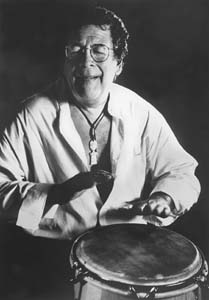![[Metroactive Music]](/music/gifs/music468.gif)
[ Music Index | San Jose | Metroactive Central | Archives ]
The Duke's Century
 Conga Lineage: Master percussionist Ray Barretto.
Conga Lineage: Master percussionist Ray Barretto.
The Stanford Jazz Workshop kicks off its summer with a celebration of Duke Ellington By Nicky Baxter TO ASSERT that Duke Ellington was the most significant musical figure this country has produced in this century would elicit few arguments. From the 1930s until his last recorded sessions in 1973, Ellington was the benchmark by which other improvisational-music artists judged themselves. Along with countless other institutions, Stanford's Jazz Workshop is commemorating Ellington's centennial (the pianist, composer and bandleader was born in April 1899). Ellington @ 100 is an ambitious project undertaken by the workshop to honor the spirit and legacy of the musical titan. The three-day series showcases one-time Ellington drummer Louie Bellson's Jazz Orchestra (Friday). The program concludes on Sunday with a solo performance by renowned pianist Jessica Williams. However, it is Saturday's presentation that should prove to be the series highlight. Ray Barretto & New World Spirit team up with guitarist Kenny Burrell for a program titled The Duke en Clave. Percussionist and bandleader Barretto has been a key figure in both improvisational music and Latin jazz since the mid-1950s, when he replaced Mongo Santamaria as lead conguero in Tito Puente's big band. Shortly thereafter, the percussionist found himself one of the most sought-after players on New York City's thriving music scene, performing with Sonny Stitt, Gene Ammons, Lou Donaldson and Jack McDuff. Barretto also worked with a battery of guitarists, most notably Burrell. Born in Brooklyn and raised in Spanish Harlem, Barretto was first seduced by jazz as a young teen. "We would listen to the Spanish-language station during the day," he recalls. "Then, later, while my mom was at night school studying English, we would switch to the jazz broadcasts. We listened to Tommy Dorsey, Glenn Miller and those cats. They were our baby-sitters." Yet it was the subtly swinging music of Ellington that opened the youngster's ears. "For me, Duke's music always stood out. No other band sounded anything like it." Contact! (Bluenote) supplies ample evidence of how Barretto and New World Spirit perform jazz "with Latin overtones." On tunes like the freewheeling "Liberated Spirit," the languidly seductive "Serenata" and the hard-boppin' "Sister Sadie," Barretto and his mates demonstrate a flair and ingenuity not often found in tradition-bound Latin jazz ensembles. Barretto's own tunes show just how fluid the bandleader's sense of swing and improvisation is. Juan Tizol's evocative "Caravan" is, however, the album's showpiece. Tizol composed the tune during his tenure in the Ellington orchestra, and it quickly became a band staple. As rendered by New World Spirit, "Caravan" gets reinvigorated. Commencing with a brief, but lovely, bass figure, Barretto and company turn "Caravan" into a journey unlike any other. Featuring Ray Vega's and Barretto's supple Afro-Cuban clave percussive strokes, "Caravan" undulates with the supple grace of a Yoruban dancer. Barretto confides that Contact!, and "Caravan" in particular, sparked the idea of The Duke en Clave project. Soon, he found himself revisiting other Ellington standards. Eventually, "Do Nothing Till You Hear From Me," "Cotton Tail," "Come Sunday" and "The Mooch" all got the Afro-Cuban clave (the essential rhythm underlying traditional Afri-Cuban music) treatment. "I was amazed and astonished at how Duke's music was so easy to adapt to a Latin rhythmic framework but still come out sounding just like Duke," Barretto says.
The Duke en Clave with Ray Barretto and New World Spirit with Kenny Burrell, takes place Saturday (June 26) at Stanford's Dinkelspiel Auditorium at 8pm. Tickets are $24. (650.725.ARTS) [ San Jose | Metroactive Central | Archives ]
|
From the June 24-30, 1999 issue of Metro, Silicon Valley's Weekly Newspaper.
Copyright © 1999 Metro Publishing Inc. Metroactive is affiliated with the Boulevards Network.
For more information about the San Jose/Silicon Valley area, visit sanjose.com.